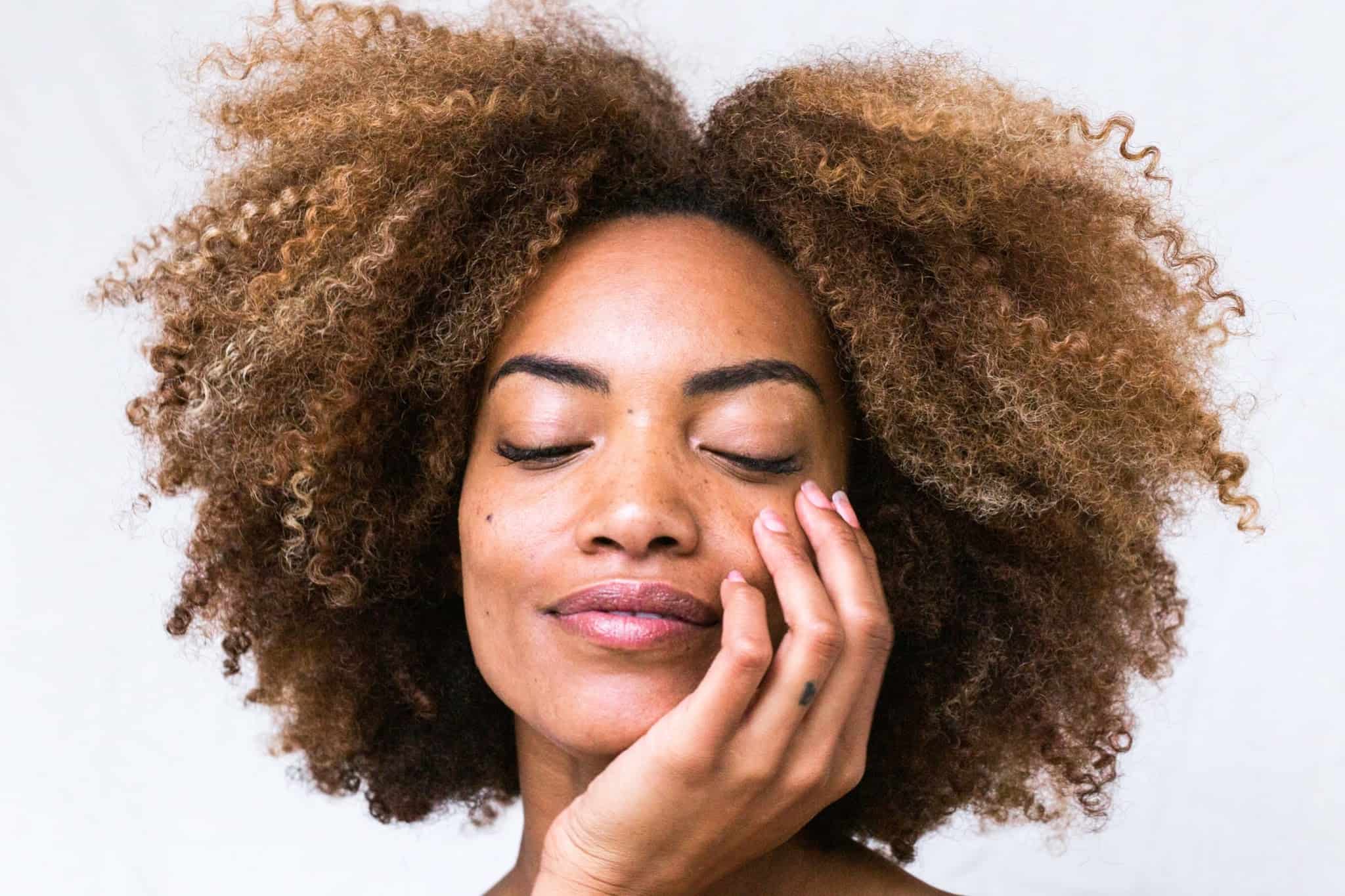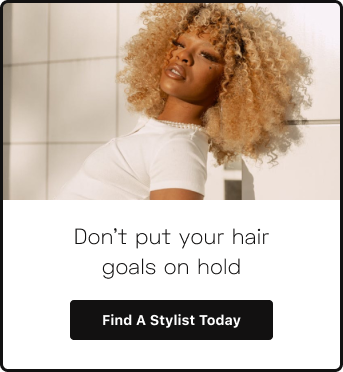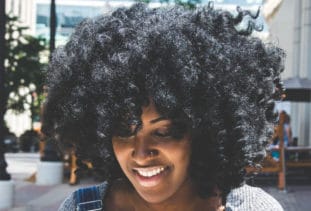While keeping your hair natural can result in luscious, healthy curls, it’s no secret that saying goodbye to relaxers and other treatments can also be quite a bit of work. From porosity to curl type, natural hair comes with its own vocabulary. It takes time and effort to build up your knowledge before you can start researching products — and that’s all before you start washing, moisturizing, or styling.
It’s normal to wish someone would simply answer your pressing question, what are the best hair products for natural hair?
Luckily for you, we’ve gathered expert advice from hairstylists to put together this guide of the best hair care products for natural Black hair. Read up and use that extra time in your calendar to give your tresses some TLC!
The Basics: Washing Natural Hair
The first step to any hair care routine is resetting the slate with a wash.
When it comes to wash day, products for all hair types fall under two categories:
- Cleanser or co-wash
- Conditioner
While there are various opinions about how often to wash natural hair, it’s best to determine what works for you based on your hair type and lifestyle. In addition, the most effective rule of thumb is to always wash dirty hair, especially if scalp build-up has surfaced.
In general, the best wash day products for natural Black hair are formulated without water-insoluble ingredients that can contribute to build-up, like silicones or waxes. Which is right for you? Read on to find out.
1. Cleanser
Cleansing products typically contain detergents to clean your hair and scalp by removing natural oils, dirt, and product build-up. While there is no overwhelming consensus about the effects of detergents like sulfates on hair, most experts agree that natural hair thrives best without harsh detergents. When in the process of learning how to grow natural hair, it is so important to not overlook the ingredients in shampoos.
Most traditional shampoos contain detergents and added ingredients that are not suitable for natural hair.
Instead, nourish your locks with:
- “Low poo” – Cleansing products with fewer detergents.
- “No poo” – Cleansing products without any detergents whatsoever.
Looser curls that tend to get oily within a few days can benefit from low-poo, while coily, kinky locks (like 4C hair) tend to thrive with ultra-gentle no-poo. Women with Afro hair should look for sulfate-free shampoo because it doesn’t strip away the scalp’s natural oils while still cleaning the surface. That way, natural hair products can enter and nourish the hair follicle.
2. Co-wash
Another way to avoid the stripping effects of detergents is to cleanse with a co-wash instead. Co-wash stands for “conditioner-only washing,” in which a moisturizing conditioner is used as a shampoo to cleanse your hair and scalp.
Co-washing is not a great option for those with fine hair or oily-prone scalps, but if your hair craves moisture, consider trying co-wash for yourself.
3. Conditioner
Natural hair needs adequate hydration — which means conditioner is your curly-hair BFF. Even if you cleanse with a co-wash, one of the most important natural hair care tips is to follow up by moisturizing with conditioner and allow the product to sit on your hair strands before rinsing it out.
While conditioning, take the following steps to hydrate your tresses:
- Use the “Squish to Condish” Technique – Some experts swear by the squishing technique, where water and conditioner are both applied liberally to hair with cupped hands in a squeezing motion. You’ll know that you’re doing this technique correctly if you hear a “squelching” sound from the water and product while you squish.
- Detangle – As you likely know from experience, dry brushing your natural hair can create a lot of frizz. And even if you’re going for a teased-out look, detangling is an essential step in your hair care routine. It’s best to detangle when hair is wet and a conditioning product has already been applied so that the process is easy, pain-free, and won’t result in a disrupted curl pattern or additional frizz. You can use your fingers or any wide-toothed comb or brush in this process.
Before applying conditioner, read the instructions on the bottle first to know how long the product should be left on wet hair. For example, a deep conditioner is usually left around three minutes longer compared to regular conditioners. Like with any other hair product, it’s important to follow instructions so that you are experiencing the benefits of the product to the fullest.
Styling Products
After you exit the shower, your hair should be clean, hydrated, and ready for the next step — styling.
Applying the product to wet, clean hair can:
- Add moisture
- Create volume
- Reduce frizz
- Define curls and waves
Which styling hair care product is best for your texture and the natural curly hairstyle you want to achieve? Consider the following before trying a product:
- Porosity – This term describes the ability of your hair to absorb and retain water. Low porosity hair doesn’t get wet easily and takes significantly longer to dry, whereas high porosity hair gets wet fast, dries quickly, and absorbs product easily.
- Curl type – The tightness of your curls, defined as wavy, curly, or kinky (or, if you’re in the know, type 2, 3, and 4 hair). Wavy hair can be easily weighed down with too much heavy product, whereas tightly-coiled curls are susceptible to dryness and breakage, requiring more moisturizing products.
- Width – The thickness of each strand of hair, from fine to coarse. Because width affects volume and hold, fine hair is prone to damage and product weigh-down, whereas coarse hair will require more deeply moisturizing products.
- Density – How closely strands of hair are packed together. Low-density hair requires lighter products or thickening agents, whereas high-density hair might need more definition.
- Color – Color-treated hair will likely be damaged to some extent and will almost always have higher porosity than untreated hair. This means that it will likely require products that provide more moisture and combat frizziness.
- Length – Long hair has its own challenges and may require more conscientious conditioning and detangling to reduce dryness and maintain healthy length.
Keep in mind that many styling products also dry with a hard cast, which means that you will want to “scrunch the crunch” out when your hair is fully dry to break this cast and reveal smooth, soft hair.
Ready to find your perfect product? Let’s dive into the next segment of our list.
4. Hair Gel
Although it gets a bad rap for resulting in hard, unnaturally shiny hair, hair gel can be great for:
- Edges
- All-day styling hold
- Defined curls
- Frizz control
While it may be too heavy for fine and low-density hair, gel could be the dream solution for adding definition to your high-density hair.
Smoothing, soft-hold gels are best for edges, whereas firm-hold gels are best for curl definition. Regardless of the type, keep an eye out for alcohol-free gel products when possible to reduce dryness.
5. Mousse
Mousse is a lightweight foaming styling product — and one of the best options for fine, low-density, and wavy natural hair. While other products easily weigh these hair types down, mousse creates volume without any added heaviness.
Mousse is typically not moisturizing, however, so it may not be the best product choice if your tresses tend to feel dry or crunchy soon after wash day.
6. Cream
Whether light or heavy, creams provide hold, definition, and frizz control while also adding moisture.
- If your crown features high-porosity, dry hair that needs the extra boost of moisture, heavy creams could do the trick.
- Light creams can also be a good option for low-porosity and medium-width hair that still needs the lightweight moisture that mousse lacks.
7. Butter
The thickest of the styling products for natural hair, butters are great sealants for coarse and high-porosity hair.
When applied to wet hair, butter products will help hair retain that much-needed moisture without allowing it to evaporate.
Butter products can be used on any hair type, but experts explain that they should typically only be used for strong-hold styling on low-porosity, fine, and wavy hair.
Extras
If you’ve just been to the beach, dyed your hair, or taken out tight braids, you might find that your hair and scalp need some extra love and care.
These optional products can help give you that added boost:
8. Leave-In Conditioners
Expert stylist Allyn Antoine is a big believer in these products, which — as the name implies — are meant to be left in longer than regular conditioner. They can:
- Provide extra moisture help with frizz control
- Repair and protect hair from color treatments or heat damage
- Define curls
9. Protein Treatments
While too much protein can damage hair, protein treatments are a popular and effective way of hydrating hair and reducing breakage. Strengthening your hair is necessary if you regularly set your hair in knotless braid styles (or other types of braids for Black hair).
For some, protein is the holy grail of natural hair treatment, and damage from too much protein is easily reversible with a return to regular conditioning practices.
To be safe, start with a protein treatment that contains a creamy or conditioner base to see how your hair responds without the risk of too much damage.
10. Scalp Oils
Expert stylist Felicia Leatherwood notes that while oils are not for everyone, they can help keep your scalp healthy. She recommends jojoba, argan, almond, and castor oil. Coconut oil is another alternative and is known for treating dandruff.
Applied directly to the scalp rather than the hair, these oils can be used before the cleansing step in your wash day routine to moisturize and exfoliate or as a kind of leave-in treatment, which is especially effective when you’re rocking protective styles like braids or cornrows that tend to require some extra scalp care.
A Few Reminders:
Having an established hair care routine not only makes hair healthy but can also affect hair growth, strength, and hair texture. Curly hair, in particular, needs extra love because it tends to be drier and more brittle than other hair types. And, damaged hair is much harder to maintain than healthy hair. Without proper hair care, you might experience hair loss, itchy scalp, and difficulty growing healthy strands.
Discover and Book Local Beauty Professionals With StyleSeat
Taking care of your natural hair is hard work that requires a thoughtful wash-day and styling routine.
And no matter how much research you do on your own, finding a knowledgeable and professional stylist is a critical part of your natural hair care. Whether you are looking for the best natural hair San Diego stylists or the best hair braiding salons in Atlanta and beyond, finding a professional in the industry who can help address your hair care needs is essential. The right stylist can recommend cutting-edge products and help you make adjustments to your routine as you switch between looks and lengths.
Have you started the search for qualified stylists in your area? Look no further than StyleSeat’s online booking app to discover and book your next hair appointment. For natural hair care in Washington D.C., Los Angeles, and all across the US, StyleSeat is the place to find the experts and care you’re looking for.
Sources:
Glamour. Apparently, I’m Obsessed With Mousse Now. www.glamour.com/gallery/best-hair-mousse/
Indian Journal of Dermatology. Shampoo and Conditioners: What a Dermatologist Should Know? www.ncbi.nlm.nih.gov/pmc/articles/PMC4458934/
Natural Hair Queen. How to Choose the Best Gel for Your Natural Hair. www.naturalhairqueen.net/best-gel-for-natural-hair/
NaturallyCurly. Celebrity Stylist Allyn Antoine’s Curl Defining Techniques for Every Curl Pattern. https://www.naturallycurly.com/curlreading/ask-a-curl-expert/celebrity-stylist-allyn-antoine-s-curl-defining-techniques-for-every-curl-pattern
NaturallyCurly. How Often Should You Wash Your Hair? www.naturallycurly.com/curlreading/wavy-hair-type-2/curlies-how-often-should-you-wash-your-hair/
NaturallyCurly. How to Condition High Porosity Hair – And KEEP It Moisturized. www.naturallycurly.com/curlreading/wavy-hair-type-2/how-to-condition-high-porosity-hair/
NaturallyCurly. Natural Hair Expert, Felicia Leatherwood, Shares her Top Tips for Healthy Hair. www.naturallycurly.com/curlreading/ask-a-curl-expert/ask-a-curl-expert-felicia-leatherwood/
NaturallyCurly. Top 8 Hair Butters for Every Curl Type. www.naturallycurly.com/curlreading/articles/top-8-hair-butters-for-every-curl-type/
New York Society of Cosmetic Chemists. An Overview on Hair Porosity. nyscc.org/blog/an-overview-on-hair-porosity/
Science Direct. Shampoo. www.sciencedirect.com/topics/chemistry/shampoo/
Science-y Hair Blog. Protein 101 – Lots of Basic Information About Using Protein in Hair Products. science-yhairblog.blogspot.com/2015/10/protein-101-lots-of-basic-information.html/
Science-y Hair Blog. Shampoos, Harsh, Mild and Otherwise. science-yhairblog.blogspot.com/2011/08/shampoos-harsh-mild-and-otherwise.html/
Slate. Self-Cleaning Hair Is a Myth. Just Shampoo It. slate.com/human-interest/2019/08/dry-shampoo-no-shampoo-what-is-best-for-your-head.html/





